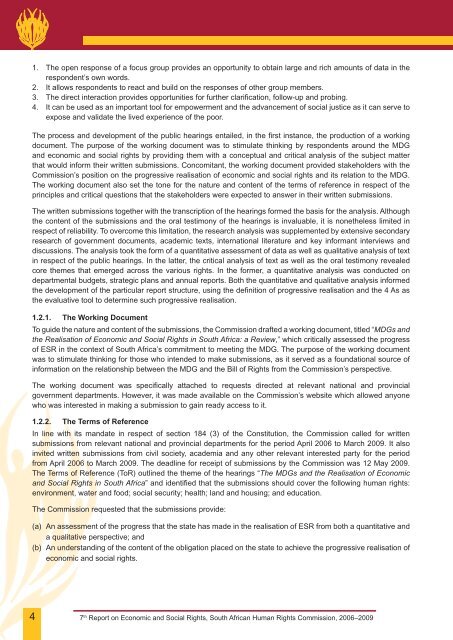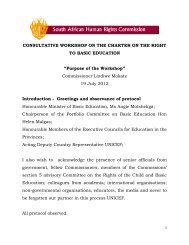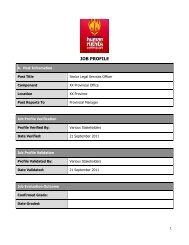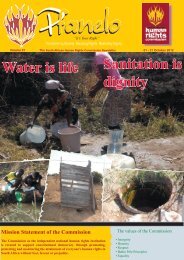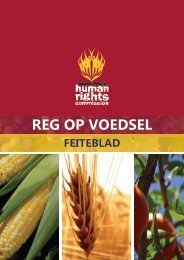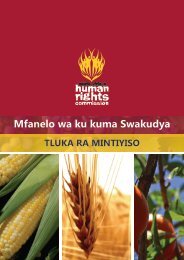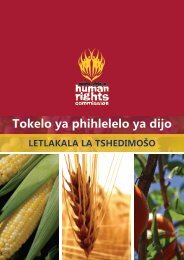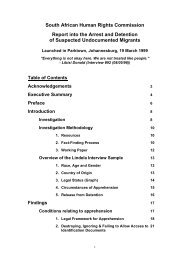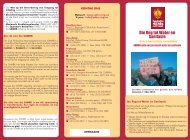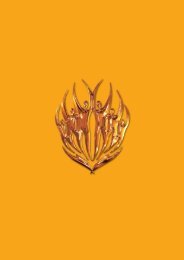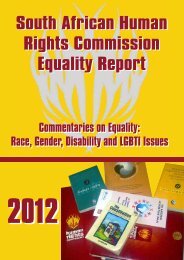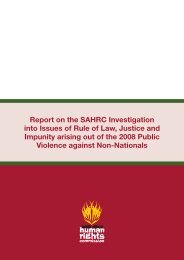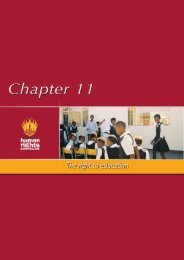Chapter 1 - South African Human Rights Commission
Chapter 1 - South African Human Rights Commission
Chapter 1 - South African Human Rights Commission
- No tags were found...
You also want an ePaper? Increase the reach of your titles
YUMPU automatically turns print PDFs into web optimized ePapers that Google loves.
1. The open response of a focus group provides an opportunity to obtain large and rich amounts of data in the<br />
respondent’s own words.<br />
2. It allows respondents to react and build on the responses of other group members.<br />
3. The direct interaction provides opportunities for further clari cation, follow-up and probing.<br />
4. It can be used as an important tool for empowerment and the advancement of social justice as it can serve to<br />
expose and validate the lived experience of the poor.<br />
The process and development of the public hearings entailed, in the rst instance, the production of a working<br />
document. The purpose of the working document was to stimulate thinking by respondents around the MDG<br />
and economic and social rights by providing them with a conceptual and critical analysis of the subject matter<br />
that would inform their written submissions. Concomitant, the working document provided stakeholders with the<br />
<strong>Commission</strong>’s position on the progressive realisation of economic and social rights and its relation to the MDG.<br />
The working document also set the tone for the nature and content of the terms of reference in respect of the<br />
principles and critical questions that the stakeholders were expected to answer in their written submissions.<br />
The written submissions together with the transcription of the hearings formed the basis for the analysis. Although<br />
the content of the submissions and the oral testimony of the hearings is invaluable, it is nonetheless limited in<br />
respect of reliability. To overcome this limitation, the research analysis was supplemented by extensive secondary<br />
research of government documents, academic texts, international literature and key informant interviews and<br />
discussions. The analysis took the form of a quantitative assessment of data as well as qualitative analysis of text<br />
in respect of the public hearings. In the latter, the critical analysis of text as well as the oral testimony revealed<br />
core themes that emerged across the various rights. In the former, a quantitative analysis was conducted on<br />
departmental budgets, strategic plans and annual reports. Both the quantitative and qualitative analysis informed<br />
the development of the particular report structure, using the de nition of progressive realisation and the 4 As as<br />
the evaluative tool to determine such progressive realisation.<br />
1.2.1. The Working Document<br />
To guide the nature and content of the submissions, the <strong>Commission</strong> drafted a working document, titled “MDGs and<br />
the Realisation of Economic and Social <strong>Rights</strong> in <strong>South</strong> Africa: a Review,” which critically assessed the progress<br />
of ESR in the context of <strong>South</strong> Africa’s commitment to meeting the MDG. The purpose of the working document<br />
was to stimulate thinking for those who intended to make submissions, as it served as a foundational source of<br />
information on the relationship between the MDG and the Bill of <strong>Rights</strong> from the <strong>Commission</strong>’s perspective.<br />
The working document was specically attached to requests directed at relevant national and provincial<br />
government departments. However, it was made available on the <strong>Commission</strong>’s website which allowed anyone<br />
who was interested in making a submission to gain ready access to it.<br />
1.2.2. The Terms of Reference<br />
In line with its mandate in respect of section 184 (3) of the Constitution, the <strong>Commission</strong> called for written<br />
submissions from relevant national and provincial departments for the period April 2006 to March 2009. It also<br />
invited written submissions from civil society, academia and any other relevant interested party for the period<br />
from April 2006 to March 2009. The deadline for receipt of submissions by the <strong>Commission</strong> was 12 May 2009.<br />
The Terms of Reference (ToR) outlined the theme of the hearings “The MDGs and the Realisation of Economic<br />
and Social <strong>Rights</strong> in <strong>South</strong> Africa” and identied that the submissions should cover the following human rights:<br />
environment, water and food; social security; health; land and housing; and education.<br />
The <strong>Commission</strong> requested that the submissions provide:<br />
(a) An assessment of the progress that the state has made in the realisation of ESR from both a quantitative and<br />
a qualitative perspective; and<br />
(b) An understanding of the content of the obligation placed on the state to achieve the progressive realisation of<br />
economic and social rights.<br />
4<br />
7 th Report on Economic and Social <strong>Rights</strong>, <strong>South</strong> <strong>African</strong> <strong>Human</strong> <strong>Rights</strong> <strong>Commission</strong>, 2006–2009


